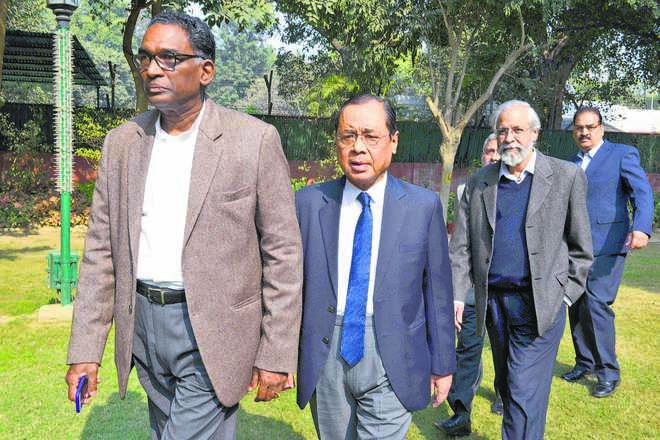
Can each Bench be allocated a sphere of jurisdiction, either in terms of the branch of law or the kind of petition filed? A Tribune photo
Shreenath A. Khemka
King’s Law Scholar, University of Cambridge
The teleological reason for creating institutions is to espouse a higher being than mere mortals who comprise them. Courts are no exception. A common fallacy in developing institutions is the tendency to push out difficult questions. Each organ of the state should be able to internally placate its internal turmoil. The challenge for our Supreme Court in the roster allocation controversy is to achieve internal tranquility without creating factions within the collegiate.
As far as the rulebook states, the Supreme Court Rules direct the roster to be prepared by the Registrar on instructions of the Chief Justice of India (CJI), and he alone is the master. No one claims the inadequacy of a Judge to head a particular subject field. Yet a feeling of injustice is perceived when the ‘popular’ choice seems to be reserved for a few. It, therefore, becomes important to understand how other jurisdictions preclude such feuds within their own judicial structures.
The American preclusion
Justice Felix Frankfurter of the American Supreme Court had advised B. N. Rau against the internal scattering of the Constitutional court. Giving heed to the practice of an en banc (full) Supreme Court, it was recommended that there would be ‘as many courts as its benches’; and rightly so. The American solution was to prevent benches in the court. Problems associated with the roster allocation in India only show up because the court sits in benches.
The British bifurcation
The UK Supreme Court adopts a random allotment of cases. With usually two benches of five or six judges, the president or the vice-president preside over each with a panel of policy-diverse and subject-expert judges. The British realised the pragmatic need to have a multiplicity of benches. Yet they ensured fairness by randomised allotments. Shuffling of cases is not suitable to India because the benches deal with a varied caseload. A bench dealing with criminal appeals would be irked with a randomly allotted writ petition.
The Australian compromise
In the Australian Supreme Court, important cases are decided by the full bench; all seven judges sit together. For other cases (where multiple smaller benches are constituted) the roster is proposed by the CJ, but it is not determinative. This led to an interesting situation in the 1930s when Justice Hayden Starke would sit on benches he wasn’t named in. However, the Indian Supreme Court of 31 judges cannot afford such liberties. Opposed to other jurisdictions, our court faces a voluminous caseload which forces scattered benches of smaller strengths. Moreover, a situation akin to Justice Starke would only open up fissures in judicial camaraderie.
The German precision
The German model is precise and crisp; judges are assigned to Senates (benches), and the jurisdiction of each Senate is defined. The determination of what cases a Senate would deal in is based primarily on the branches of law, with the presidential board annually shuffling their compositions. Therefore, it becomes impossible to allot a case to a specific judge after it comes up before the court. The Germans have understood that fairness cannot be in a post facto allocation, but only when allocation happens before cases come up. This is what the Indian courts should be aiming for.
The Indian reforms
The fundamental tenant of fair play is best enshrined in the principles of natural justice: nemo iudex in causa sua (no man can be the judge of his own cause). In order to preclude any bias, the CJI must demonstrate that he is not the determiner in a system where he himself is a participant. To ensure this, three essentials must be adopted within the existing system of roster allocation.
First, a fair model must have an unambiguous distribution. Benches should be constituted keeping in mind the requirement of their number and size. And each Bench should be allocated with its own sphere of jurisdiction, either in terms of the branch of law or the kind of petition filed.
Second, the model must not be retrospective. Once a case comes up to the court it would be procedurally unfair for it to be allotted to any Bench. Allotments should be blind in respect of the specificities of the case.
Third, such a model must not only be made aware to the participating Judges, but to the public at large. Any deviation can only be prevented if there is adequate awareness of what rules are laid down.
This would strengthen the trust that the public holds, in what a few say is an opaquely governed institution. We cannot take away the operational organisation of the courts which have developed sui generis to our esoteric legal environment. Yet, there must be enough scope for judges to be shuffled as long as the tenants of fair play are not jeopardised. Such should be the framework of roster allocation in India.



























